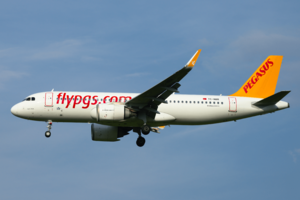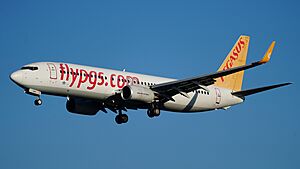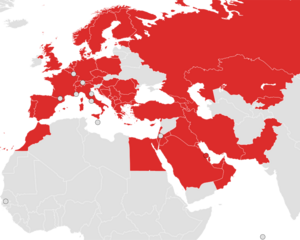Pegasus Airlines facts for kids
| Founded | 12 January 1991 |
|---|---|
| Operating bases |
|
| Frequent-flyer program | Pegasus BolBol |
| Subsidiaries | Pegasus Cargo |
| Fleet size | 117 |
| Destinations | 134 |
| Parent company | ESAS Holding |
| Revenue | |
| Operating income | |
| Net income | |
| Total assets | |
| Total equity | |
| Employees | 6,164 (December 2023) |
Pegasus Airlines, also known as Flypgs, is a popular Turkish airline. It's a "low-cost" airline, which means it tries to offer flights at lower prices. Its main office is in Istanbul, Turkey, and it flies from many airports across Turkey.
Contents
The Story of Pegasus Airlines
How Pegasus Airlines Started
Pegasus Airlines began on December 1, 1989. Two companies, Net and Silkar, teamed up with another airline called Aer Lingus. They wanted to create a special airline for holiday tours. Pegasus Airlines started flying on April 15, 1990, using two Boeing 737 planes.
The name "Pegasus" comes from Greek stories. Pegasus was a famous winged horse. Soon after the airline started, a war happened in Kuwait. This made fewer tourists visit Turkey. But by 1992, people started traveling again. Pegasus Airlines grew by getting a third Boeing 737-400. They also rented two Airbus A320 planes for the busy summer season.
After two good years, Aer Lingus and Net sold their shares in 1994. A bank in Istanbul bought them. This made Pegasus Airlines a fully Turkish company.
In 1997, Pegasus Airlines ordered new planes from Boeing. They were the first Turkish airline to order the newer Boeing 737 Next Generation planes. They also agreed to rent 10 more Boeing 737-800s.
Becoming a Low-Cost Airline
In January 2005, a company called ESAS Holdings bought Pegasus Airlines. They made Ali Sabanci the new boss. Just two months later, he changed the airline. It stopped being just for holiday tours and became a low-cost airline. This meant it focused on offering cheaper flights.
In November 2005, Pegasus ordered 12 new Boeing 737-800s. They ordered 12 more in November 2008. These orders were flexible, meaning they could change the type of plane based on what customers needed.
By 2007, Pegasus Airlines was carrying 15% of all domestic passengers in Turkey. This grew to 27% by 2013. In 2019, they flew almost 30 million passengers!
Recent Developments
In 2011, Pegasus Airlines worked with another airline, Air Berlin. They created "Air Berlin Turkey" for flights between Germany and Turkey. But this new airline later joined Pegasus Airlines in 2013.
In 2012, Pegasus Airlines made a huge order for up to 100 Airbus A320neo family planes. This was the biggest plane order ever by a Turkish airline at that time. Pegasus became a new customer for Airbus. Also in 2012, Pegasus Airlines bought part of a Kyrgyz airline called Air Manas. This airline then started flying as Pegasus Asia in 2013.
In 2013, Pegasus Airlines offered some of its company shares to the public. This meant people could buy parts of the company. The shares started trading on the Borsa Istanbul stock exchange.
In 2016, Pegasus Airlines announced they were renting out some of their planes. This was because fewer passengers were flying at that time.
In 2022, Pegasus Airlines had a computer problem. Some information was accidentally seen by others online. This included some internal passwords and details about flight crew. The problem happened because a storage system was not set up with enough security. Other airlines that used the same system were also affected.
How Pegasus Airlines Works
Business Information
Here's a quick look at how Pegasus Airlines has grown over the years:
| Net profit (US$ m) |
Number of employees |
Number of passengers (m) |
Passenger load factor (%) |
Fleet size | References | |
|---|---|---|---|---|---|---|
| 2015 | 38.0 | 4,967 | 22.3 | 79.0 | 67 | |
| 2016 | −38.5 | 5,257 | 24.1 | 78.6 | 82 | |
| 2017 | 131 | 5,337 | 27.8 | 84.6 | 76 | |
| 2018 | 94.9 | 5,621 | 29.9 | 85.5 | 82 | |
| 2019 | 224 | 6,164 | 29.8 | 86.0 | 84 | |
| 2020 | −264 | 6,130 | 14.7 | 79.7 | 93 | |
| 2021 | −148 | 5,837 | 20.1 | 77.3 | 90 | |
| 2022 | 379 | 6,765 | 26.9 | 83.6 | 96 | |
| 2023 | 710 | 7,670 | 31.9 | 84.8 | 110 | |
| 2024 | 375 | 8,459 | 37.4 | 87.7 | 118 |
The "Net profit" shows how much money the airline made after all costs. A minus sign means they lost money that year. "Number of employees" is how many people work for the airline. "Number of passengers" is how many people flew with them. "Passenger load factor" shows how full the planes were. "Fleet size" is how many planes they had.
Inside the Plane
Pegasus Airlines planes have one type of seating for all passengers. They have a "Flying Cafe" where you can buy food and drinks during your flight. Some of their newer Boeing 737-800 planes have a special "Boeing Sky Interior." This design makes the inside of the plane feel more open and comfortable.
Training and Maintenance
Unlike many low-cost airlines, Pegasus Airlines has its own training center for flight crews. They also have their own maintenance team called Pegasus Technic. Both centers are fully approved. They help train new staff and keep the planes in great condition.
Sports Sponsorships
From 2011 to 2013, Pegasus Airlines was a sponsor for Nef Stadium. This is the home stadium of a famous Turkish football team, Galatasaray S.K..
Where Pegasus Airlines Flies
As of July 2024, Pegasus Airlines flies to 148 different places. These destinations are in 53 countries across Europe, Asia, and North Africa.
Partner Airlines
Pegasus Airlines works with other airlines to offer more flight options. This is called a codeshare agreement. It means you can sometimes buy a ticket from Pegasus, but fly on a plane operated by one of their partners.
- Delta Air Lines
- Flynas
- ITA Airways
- KLM
- Nile Air
- Qatar Airways
They also have "interline agreements" with other airlines. This helps passengers connect between different flights more easily.
- Air Transat
- Emirates
- Norse Atlantic Airways
The Pegasus Airlines Fleet


A "fleet" is the collection of all the planes an airline owns and operates.
Current Planes
As of August 2025, Pegasus Airlines uses these planes:
| Aircraft | In service | Orders | Passengers | Notes |
|---|---|---|---|---|
| Airbus A320-200 | 9 | — | 180 | These planes will be replaced over time. |
| Airbus A320neo | 46 | — | 186 | |
| Airbus A321neo | 64 | 45 | 239 | |
| Boeing 737-800 | 9 | — | 189 | These planes will be replaced over time. |
| Boeing 737 MAX 10 | — | 100 | TBA | They have options for 100 more planes. |
| Total | 128 | 145 | ||
Past Planes
Pegasus Airlines has also used these types of planes in the past:
| Aircraft | Total | Introduced | Retired | Notes |
|---|---|---|---|---|
| Airbus A300B4-200 | 2 | 1996 | 1997 | |
| Boeing 737-300 | 1 | 2008 | 2009 | Rented from another airline. |
| Boeing 737-400 | 16 | 1990 | 2013 | |
| Boeing 737-500 | 3 | 2006 | 2011 |
Flight Safety Information
Aviation is very safe, but sometimes incidents happen. Here are some events involving Pegasus Airlines flights:
- On March 10, 2010, a plane had a problem with its front landing gear. It landed safely at Frankfurt Airport in Germany, but the front tires burst. Everyone on board was safe.
- On February 7, 2014, there was an attempted hijacking on Pegasus Airlines Flight 751. A passenger claimed to have a bomb and wanted the plane to fly to Sochi. The plane landed safely in Istanbul, and everyone was unharmed.
- On January 13, 2018, Pegasus Airlines Flight 8622 went off the runway while landing in Trabzon, Turkey. The plane slid down a cliff but got stuck in the mud, stopping it from going into the Black Sea. All 168 people on board survived, and no one was hurt.
- On January 7, 2020, Pegasus Airlines Flight 747 went off the runway after landing at Istanbul Sabiha Gökçen Airport. All 164 people on board got out safely using the emergency slides, and no one was injured.
- On February 5, 2020, Pegasus Airlines Flight 2193 also went off the runway while landing at Istanbul Sabiha Gökçen Airport. The plane broke into three parts, and one engine caught fire. Sadly, three passengers lost their lives, and 179 people were injured.
- On January 26, 2021, Pegasus Airlines Flight 939 landed with its nose landing gear turned sideways. The tires burst from the friction, but the plane landed safely.
See also
 In Spanish: Pegasus Airlines para niños
In Spanish: Pegasus Airlines para niños
- Air Manas
- AJet
Images for kids
-
A former Pegasus Airlines Boeing 737-400 in its old colors (2002)
-
A former Pegasus Airlines Boeing 737-400 with special Beko colors (2009)




